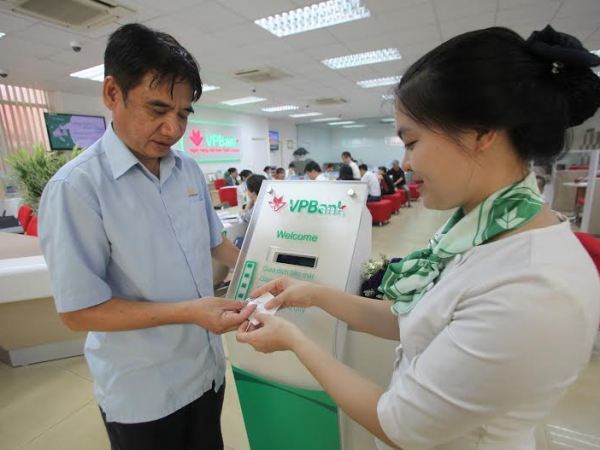 Business Beat
Business Beat


|
| VPBank announces a huge loss of VNĐ81 billion (US$ 3.52 million) in its foreign exchange business, down from a profit of VNĐ251 billion ($10.9 million) in the same period last year. —Photo VPBank |
Thiên Lý
HCM CITY — One thing that stands out in many banks’ third quarter reports is the sharp drop in profits from foreign exchange trading activities.
Saigon Economic Times reported that 10 out of the polled 14 banks reported a drop in the first nine months, with three of them slipping into losses as a result.
VPBank was among the loss makers.
It announced a huge loss of VNĐ81 billion (US$ 3.52 million) in its foreign exchange business, down from a profit of VNĐ251 billion ($10.9 million) in the same period last year.
VIB reported a loss of VNĐ115 billion ($5 million).
In reality, some lenders still made profits from their foreign exchange transactions however their earnings in this area also went down significantly.
SeABank saw a 79 per cent decrease to VNĐ15 billion.
BacABank, Saigonbank, VietABank, and Techcombank all reported drops of 62 per cent to 68 per cent.
What lay behind this rot?
Analysts blamed it on the stable exchange rates, explaining banks profit mainly from forex fluctuations.
Indeed, since the beginning of the year the forex market has witnessed only some minor fluctuations, with the biggest one being between May 6 and 20 when the dong weakened against the dollar to VNĐ23,470-23,495 from VNĐ23,300, where it had stayed for a very long time.
However, it soon recovered to the old level by the third quarter end.
The State Bank of Việt Nam’s benchmark VNĐ-$ rate continued to be steady in October at around VNĐ23,150 to the dollar.
The buying and selling rates at commercial banks were around VNĐ23,145 and VNĐ23,265.
At Vietcombank, the country’s biggest foreign exchange trader, the buying price of the greenback in late October was VNĐ23,145 to the dollar, down by VNĐ15 from September and the same rate as earlier this year.
A major reason for the stability of the forex market has been the abundant supply of the greenback.
According to the General Statistics Office, by September Việt Nam’s foreign currency reserve was standing at a record $70 billion.
The Government’s efforts to check the use of the dollar in the economy has proven highly effective in recent years, affecting banks’earnings from foreign exchange trading.
In August last year the Government issued Decision 986 on the Development Strategy of Vietnam Banking Sector to 2025 to increase the independence and accountability of the State Bank of Vietnam (SBV) to ensure efficient management of monetary policies, inflation control and economic stability.
Under the strategy, the banking sector has set targets of reducing the number of foreign exchange transactions and achieving a ratio of foreign currency deposits to total bank deposits of less than 7.5 per cent by 2020 and 5 per cent by 2030.
Decision 986 also seeks to completely stop foreign currency lending by 2030.
With the Government seeking to tighten foreign currency lending and reduce foreign exchange transactions, banks’profits from forex trading would continue to erode, experts said.
High interest rates make unsecured corporate bonds attractive
According to statistics from the Hà Nội Stock Exchange (HNX), the total funds that companies mobilised in the first nine months of the year by issuing bonds was over VNĐ179.084 trillion (US$7.9 billion).
In October many enterprises continued to successfully issue corporate bonds, including TNG Investment and Trading Joint Stock Company.
The company issued successfully individual bonds worth VNĐ136 billion with a coupon rate of 11.5 per cent.
Notably, many of the successful issues were not backed by assets or financial guarantees and even lacked credit ratings.
An asset-backed security (ABS) is a financial security such as a bond or note collateralised by a pool of assets such as loans, leases, credit card debts, royalties, or receivables.
A guaranteed bond comes with a secondary guarantee that interest and principal payments will be made by a third party should the issuer default due to reasons such as bankruptcy.
It is intriguing that despite the absence of any kind of security, most bond issuances attracted investors.
The answer lies in the fact that interest rates were attractive.
IDJ Vietnam Investment Joint Stock Company’s bonds, for instance, offered 13 per cent interest and were fully subscribed.
Saigon Vina Land Joint Stock Company raised VNĐ100 billion through three-year bonds with a coupon rate of 11.5 per cent.
But the Ministry of Finance has sounded a warning about the possible risks for investors, particularly banks, from this competition to offer high interest rates.
Phạm Phú Quốc, deputy director of the HCMC Institute of Development Studies, also expressed concern about the competition that is driving bond interest rates higher and higher even as tools needed to ensure investors’ safety such as backing by assets, credit ratings and guarantees have not been made compulsory.
It is also affecting the central bank’s goal of stabilising interest rates, he said.
A finance ministry official said most buyers of corporate bonds are individuals, many with limited financial capacity and poor understanding of bonds, and so should be warned of the risks, especially as interest rates rise.
The ministry has proposed some amendments to Decree 163 to protect small investors.
According to the decree, corporate bonds are issued in two forms: public issues and private placement.
Private placements are made to less than 100 investors and cannot be marketed on the media or online.
One of the provisions in the decree the ministry plans to amend is the permission to trade these bonds publicly one year after issuance, which brings risks to small investors.
Ministry insiders said the one-year restriction is too short since individual investors often lack the knowledge or experience to understand the possible risks.
They want a ban on public trading through the full term of the bonds. In other words, they want these bonds traded only among professional and institutional investors and never publicly.
Experts from the Việt Nam Bond Market Association said the ministry should strengthen the credit rating market to safeguard retail bond investors.
They also stressed the need for securities companies to improve the quality of their services and ensure the integrity of their consultants to minimise small investors’ risks. — VNS